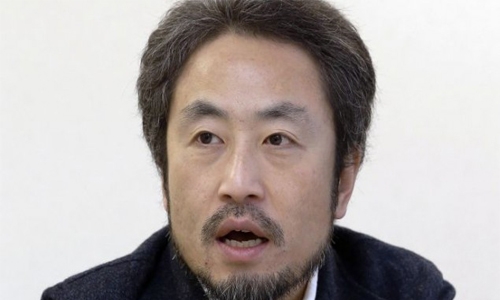Japan investigating report of journalist kidnapped in Syria
Japan said Thursday it was investigating the reported kidnapping of a Japanese journalist in Syria by an armed group, after two of its citizens were beheaded earlier this year.
Media rights group Reporters Without Borders said Jumpei Yasuda, a freelance journalist, was kidnapped in July as he was crossing the border into the country and is still being held hostage by the group, which was not named.
Chief Cabinet Secretary Yoshihide Suga declined to directly confirm the report when asked about it at a regular media briefing, but stressed the government was obligated to ensure the safety of Japanese citizens.
"We are doing our best... and making full use of various intelligence networks," he added, without elaborating.
Earlier this month, Prime Minister Shinzo Abe set up a new unit to collect and analyse information on global terrorism concentrating on four areas, including the Middle East.
Reporters Without Borders said Tuesday that the armed group had started a countdown for the payment of a ransom, "failing which they are threatening to execute him or sell him to another terrorist group".
The watchdog called on Tokyo to "do what is needed to save this journalist".
Its report came after a flurry of speculation in Japan since the summer that Yasuda had entered Syria and been captured.
Yasuda had posted frequent comments on Twitter, expressing frustration that many journalists were staying away from Syria. But the tweets abruptly stopped on June 21.
In his last Twitter post on that day, he said: "I have reported what is happening through my blog and Twitter without disclosing where I am."
He added that unspecified "interference" with his reporting activities had increased substantially to the point that he might not be able to continue.
In a video released in January, Islamic State militants said they had beheaded war correspondent Kenji Goto, a week after the group also claimed responsibility for the death of his friend Haruna Yukawa, a self-styled contractor.
In the run-up to the executions, the Japanese government struggled to make contact with the militants, primarily relying on countries such as Turkey as well as local religious leaders.
Reporters Without Borders said Yasuda was trying to cover stories including the execution of Goto, who it said was a friend of his.
Yasuda was briefly captured in Iraq in 2004 while reporting there.
The two beheadings, together with the death of 10 others in a hostage crisis in Algeria in 2013, have highlighted the vulnerability of Japanese people abroad.
Related Posts

